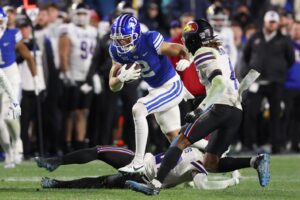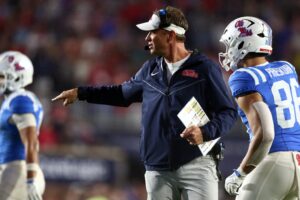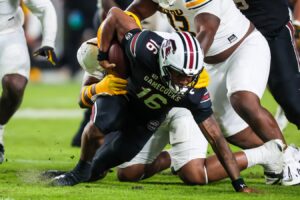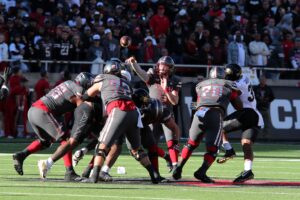The South Carolina Gamecocks parted ways with maligned offensive coordinator Kurt Roper this week. If you followed the team’s coverage on social media this season you may have one big question. Who will the fans pile their blame on now? There is a saying in football that the most popular player is the backup quarterback. When it comes to the coaches, the most blamed is usually the head of the offense. That was no different in Columbia the past two seasons. Despite having a solid 8-4 season, Will Muschamp’s team will go in a different offensive direction moving forward. The Gamecocks’ offense ranked 102nd in scoring this season, so a change was warranted.
Coach Muschamp has stated he will not name a full-time replacement until after the Outback Bowl. Co-offensive coordinator and receivers coach Bryan McClendon will call plays for the upcoming match-up with Michigan. There were a lot of factors to the Gamecocks’ struggles, and the need for a new offensive direction is not all Kurt Roper’s fault. We take a look at all the factors involved, and despite the numbers, why the new offensive coordinator could make a quick turnaround.
Injuries
South Carolina was hit with a rash of injuries this season. The loss of playmaker Deebo Samuel stands outs the most, but it may not have been the most critical. Center Alan Knott was the only offensive lineman to start in the same position in each game this year. Guard Donnell Stanley started each game but rotated between left and right guard depending on who was available. Cory Helms, Zach Bailey, and Malik Young all missed multiple games due to injury. The Gamecocks’ offense also lost tailback Rico Dowdle and tight end K.C. Crosby to significant injuries. Having to mix and match you lineman to find a healthy group is hard enough on an offense, losing several playmakers on top of that doesn’t make things any easier.
Good Jake, Bad Jake
Quarterback is often looked at as the most important position in sports. If your team gets inconsistent play from that position, their offensive direction will not be a good one. Jake Bentley was up and down all season in Columbia, and the offense went as he did. Early in the year, Bentley was at times running for his life behind a makeshift offensive line. It seemed that even as the line got healthy and played better, Jake was still uncomfortable. Bentley led the SEC in completions in 2017 but was eighth in yards per attempt. As a freshman, he was one of the more accurate downfield passers in the conference, but he did not fare as well on deep throws in 2017.
Bentley is still learning and growing into the quarterback position, he started all 12 games this year, giving him 18 starts for his young career. The Gamecocks have a solid group of pass catchers, but once Deebo was injured, they lacked a game changer. Relying on short passes is not a bad option, but if you don’t have guys who can take a short pass, make someone miss and turn it into a big gain, the offense tends to stall eventually. Bentley also missed deep throws early in games that could have been easy touchdowns. How things could’ve been different if he had connected on even a few of those missed opportunities. Bentley overthrew Hayden Hurst on the first drive of the Clemson game, missing a chance to strike down the field early.
Conservative Predictability
One of the biggest criticisms of Roper was that his play-calling was too conservative and predictable. There were too many times where it seemed fans and commentators knew what plays were coming from the Gamecocks’ offense. If fans and commentators know, then be assured that opposing defenses were keyed into what South Carolina was running. In the preseason, Roper spoke of attempting five or six deep shots each game. That never materialized.
Most of this team’s biggest pass plays came on scrambles by Bentley, where he eluded the rush and someone broke open downfield. Long touchdown passes to Deebo Samuel, vs N.C. State, and Shi Smith, at Texas A&M, come to mind. When your QB is first in completions but middle of the pack in yards, touchdowns, and yards per attempt, the perception will be that the play calling isn’t aggressive. While that was certainly true in some instances, missing on big plays early in games also factors in.
Running in Place
The run game was a bit of an enigma for South Carolina. After Rico Dowdle was lost to injury, Ty’Son Williams and A.J. Turner got eh bulk of the carries. Both backs averaged over five yards per carry on the season, but they combined for less than 1,000 yards and only four touchdowns. There were a few games where the Gamecocks merely abandoned the run for some reason. They also struggled to pick up crucial yards on far too many 3rd or 4th and short situations. The loss to Kentucky and can be squarely put on those particular failings.
Some of that can be put on the shuffling of the offensive line, but sometimes you need your tailbacks to make guys miss on their own. That did not happen enough. The line did perform well late in the year, as they got healthy and had a chance to build some cohesiveness. Unfortunately, execution let this team down just as often as the play calling.
New Offensive Direction
There will be change now, maybe the raising level of voices was heard. Maybe just by looking at the numbers, it was evident a change was needed. The Gamecocks will now go in a new offensive direction. What direction will be the question? Coach Will Muschamp is a defense-first coach and has been known to want a conservative offense that helps his defense. One that helps by not turning the ball over and by grinding down the game to keep the defense rested. It is the formula he learned as an assistant to Mack Brown and Nick Saban.
However, in this new age of college football, where up-tempo spread offenses catch the eye, it may be time for a change. Programs like Auburn, Clemson, and Ohio State have proven that you can have an exciting explosive offense, and not have that affect your ability to have a dominant defense. A fun, exciting offense and a dominant, physical defense are not mutually exclusive. Whoever guides this team in its new offensive direction, they should have plenty to work with.
Returning Talent
The offensive line loses seniors Alan Knott and Cory Helms, and junior tight end Hayden Hurst recently declared for the NFL draft. The rest of the offense remains intact. Young receivers Bryan Edwards, Shi Smith, and OrTre Smith all return. Deebo Samuel, K.C. Crosby, and Rico Dowdle will be back healthy next season. Jake Bentley will be entering his third season as a starter under center. The offensive line’s injuries could become a blessing in disguise in the long run. A couple of the younger lineman got thrown into the fire this year. They should be better because of the experience. There will be a new man in charge of the Gamecocks’ offense next season, and he will have plenty of pieces at his disposal regardless of his philosophies regarding the new offensive direction.
Main Photo Credit:







